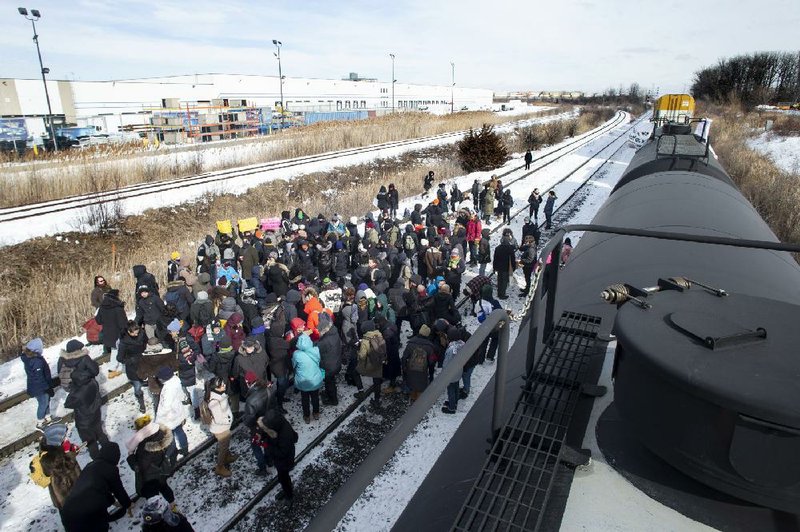MONTREAL -- Via Rail, Canada's passenger train service, said Wednesday it is temporarily laying off 1,000 employees because of the continued halt in service on Canadian National Railway Co.'s tracks in eastern Canada caused by railway blockades protesting a British Columbia pipeline.
The government corporation has suspended passenger trains on the Montreal-Toronto and Ottawa-Toronto routes for two weeks because the protests have disrupted rail service across the country.
The layoffs come amid growing pressure on Prime Minister Justin Trudeau's government to take action against the blockades organized in support of Wet'suwet'en hereditary chiefs who oppose a natural gas pipeline in British Columbia.
Via Rail Chief Executive Officer Cynthia Garneau called the service interruptions "unprecedented."
"In 42 years of existence, it is the first time that Via Rail, a public intercity passenger rail service, has to interrupt most of its services across the country," she said in a statement.
The passenger rail company has canceled more than 530 trains since blockades began Feb. 6.
Earlier this week, Canadian National Railway Co. temporarily laid off about 450 workers from its operations in eastern Canada after canceling more than 400 of its trains since protests arose.
And demonstrators are now obstructing Canadian Pacific Railway Ltd.'s tracks near Kamloops, in British Columbia's interior. "CP has been impacted by the blockades and continues to monitor the situation closely, in close collaboration with key stakeholders," spokeswoman Salem Woodrow said by email Thursday.
Trudeau called it an unacceptable situation that needs to be resolved in the weeks and months to come. He has urged patience and warned against using force.
Rail blockades are beginning to pressure supplies of some commodities across Canada. Quebec is rationing propane with about a week of inventories. Stockpiles, which usually last two to three weeks, are being rationed, with schools and hospitals getting first priority, said Claude Potvin, press secretary for the minister of energy and natural resources.
Shipments of agricultural products are also being disrupted, hurting business for exporters. "As this thing persists, it's going to have more and more of an impact on the Canadian economy and companies that use the rail system to conduct business," Nutrien Ltd. Chief Executive Officer Chuck Magro said Wednesday in a phone interview.
Demonstrators have set up blockades in solidarity with opponents of the Coastal GasLink pipeline project that crosses the traditional territory of the Wet'suwet'en First Nation in northwestern British Columbia.
Hereditary chiefs in the Wet'suwet'en First Nation oppose the natural gas pipeline through their traditional territory, though it has received approval from elected band councils.
Fresh blockades went up Wednesday on a Canadian National Rail line in Edmonton, Alberta, and in St. Lambert, Quebec, across the St. Lawrence River from Montreal -- both involving protesters acting in solidarity with the Wet'suwet'en. The Edmonton blockade ended after a few hours, when a group of counter-protesters with a truck arrived and began tearing down the barriers.
One Wet'suwet'en hereditary chief said the chiefs won't meet with the federal government over their opposition to the pipeline until both the Royal Canadian Mounted Police and Coastal GasLink leave their traditional territory.
Na'moks, who also goes by the name John Ridsdale, said the chiefs have communicated their terms to Carolyn Bennett, the federal minister responsible for government-indigenous relations, who has been seeking a meeting with the chiefs.
Bennett released a letter she sent to the hereditary chiefs Wednesday, saying she and her British Columbia counterpart Scott Fraser would meet with any of the chiefs willing to talk.
Canadian Public Safety Minister Bill Blair said the Trudeau government won't issue an ultimatum to remove the blockades.
Alberta Premier Jason Kenney, who has been critical of the blockades, said he expects police to respect and enforce court orders.
"These illegal blockades -- there's people losing their jobs, blue-collar people, vulnerable people," he said while in Calgary. Alberta. "What is happening here is anarchy."
Information for this article was contributed by staff members of The Associated Press and by Divya Balji, Robert Tuttle, Stephen Wicary and Jen Skerritt of Bloomberg News.
Business on 02/21/2020
